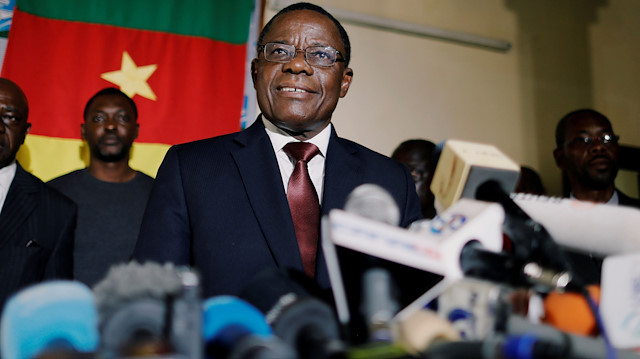
Locally elected officials fear elections without peace in English-speaking regions
Cameroon on Feb. 9 will host double elections, legislative and municipal, despite worrying socio-political crisis and insecurity in the English-speaking northwestern and southwestern regions of the country.
Armed separatist groups have been threatening security in this part of the country for more than three years. A few weeks before the legislative and municipal elections, they are trying to ban people from casting their votes.
"People have to visit the southwest and go down to the fields in the northwest to see if, in a context of war, we can have free and fair elections. I am really going to say no, but I would like someone to prove me wrong," said Njong Evaristus Ndim, deputy member of the main opposition Social Democratic Front (SDF).
In the country's northwestern regions, the offices of the Elections Cameroon (ELECAM), in charge of the country's elections, are not functional, he told Anadolu Agency.
"Prove to me that you can also visit the electoral offices of ELECAM and how functional they are. Apart from Bamenda, the capital of this region, the other offices are not functional. Everyone is on the run. I am a member of the parliament for Boyo in the northwest, but I am in Yaounde. I can't even get into my riding," Evaristus Ndim added.
He also said his fellow MPs from the ruling Cameroon People's Democratic Movement (CPDM) party, "who are supposed to be privileged", are also unable to reach the areas they are supposed to represent in the conflict zones.
"Several members of our party have been and are being kidnapped in various constituencies. Police stations should be set up in different localities. And yet there are not many of them. Even the agents in charge of organizing these elections are wondering how they will set up the ballot boxes with the armed conflict. But also how will they get closer to the people so that they will have the opportunity to vote?" decried Evaristus Ndim.
According to him, with the level of insecurity, people will be forced to go only to localities with police stations and vote for representatives they do not even know.
"Is this justice? Local people are supposed to vote for those they know, believe in and expect for the development of their aspirations. But in reality, local people are afraid, threatened and lack confidence because the government fails to guarantee their safety. Meanwhile, the armed groups forbid them to take part in voting. How are these people supposed to go and vote? And if they don't, who will be their local leaders?" asked the SDF representative.
- Real dialogue needed before elections
He does not understand why the head of the country decided to give priority to the organization of these elections instead of bringing peace first.
"Peace has not yet been established in the two English-speaking regions, it is a fact," said Joseph Mbah Ndam, a SDF deputy in the northwest.
"We have submitted our voters' lists to demonstrate the impossibility for these elections to take place in this context," he added.
He also marked a factor that hinders the upcoming elections to be held.
"ELECAM asked us to put representatives at the police stations and we did not do so. We can't do it, because everyone has left the districts. So, those are the peculiarities of the situation. How are the elections going to take place when we can't put these officers?" asked Mbah Ndam.
But he hopes that the president of the country will allow the elections to take place freely and safely.
"But if, in the end, the pressure is not changed from what we know now, the elections will of course be impossible," he said.
Evaristus Ndim also wondered how he and voters without protection are supposed to move for election campaigns and voting.
He said: "The barrel of the gun can never bring total peace. What Cameroonians need the most is a real dialogue before addressing the issue of elections".
Wanlo John Chiamua, a member of the parliament from CPDM, said more optimistically that he trusts the government, and believes it will take the necessary measures for civilians.
"Security arrangements have been made to ensure that, throughout the country, all our citizens can exercise their right to vote. If necessary, they will be reinforced," said Cameroonian President Paul Biya in his end-of-year speech on Dec. 31. This was also confirmed on Monday by Territorial Administration Minister Paul Atanga Nji at a meeting of governors dedicated to the upcoming elections.
Atanga Nji spoke from Yaounde and he would not dare to venture into conflict zones such as the city of Bamenda without a military escort, said Evaristus Ndim, being skeptical about the security arrangements.
He also reminded the multiple attacks on the governor of the northwest during his displacement in spite of the armored vehicles and all the security protocol.


